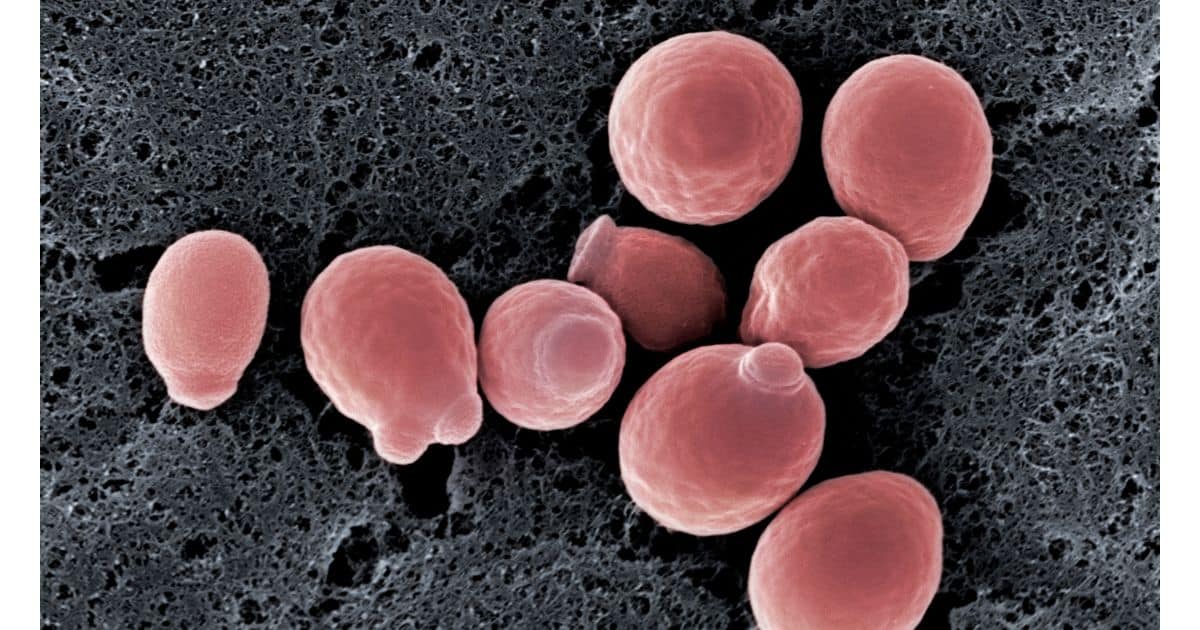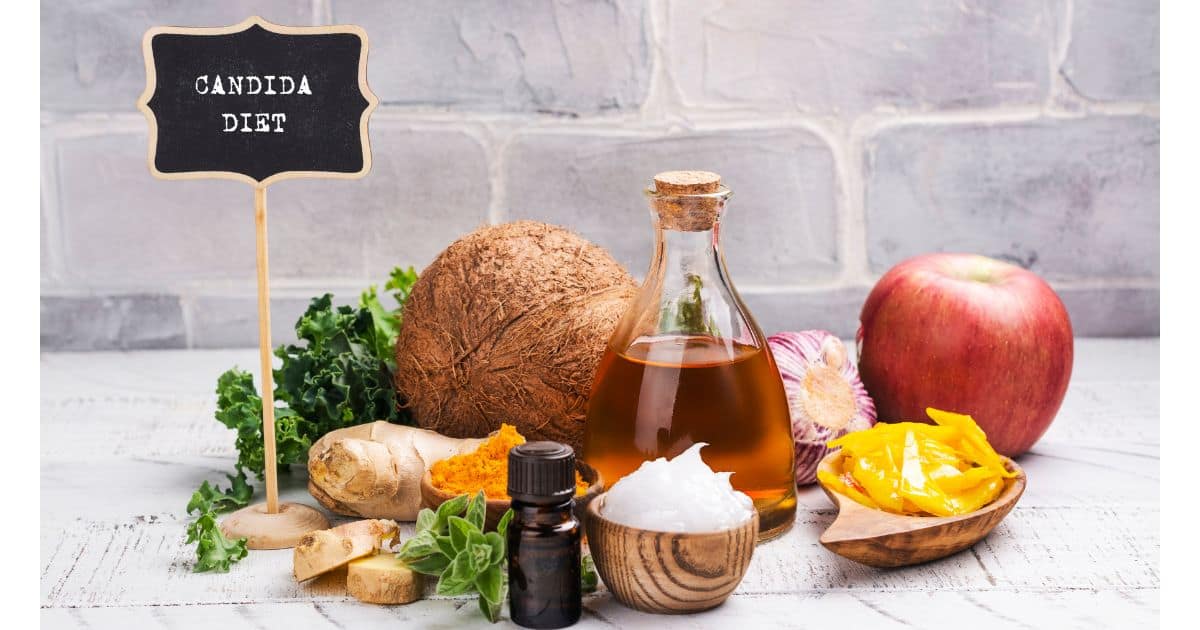In my Functional Medicine practice, yeast or Candida overgrowth is part of almost every client’s case. Many of our clients consult us with their unwanted hormone and gut symptoms, which yeast infection often contributes to.
Candida causes various symptoms in virtually every body system in the human body, with the digestive tract and immune system being the most vulnerable. Candida overgrowth causes an imbalance between your microbiome’s good and bad bacteria.
What is Candida overgrowth?

Candida albicans, commonly known as Candida, is an organism that naturally occurs as part of a healthy microbiome in your mouth and digestive tract when it is found in appropriate amounts.
It is commensal, meaning that it has a purpose and aids your digestive tract to stay healthy, but it can also be pathogenic (causing harm) by nature. Candida albicans is the most common fungus that we live with.
Candida thrives in the inner creases and crevices of a woman’s digestive tract and the vaginal tract. Candida Albicans is a form of fungus that helps with nutrient absorption when healthy. But when it overgrows and becomes pathogenic, causing infection, it can contribute to breaking down your intestinal lining, leading to a “Leaky Gut.” You can suffer from mouth, throat, and esophagus candida infections.

From there, candida organisms (and their toxic byproducts called endotoxins) can get into the bloodstream, circulate around the body, and cause inflammation, infection, and other problems, ranging from digestive problems to skin issues to panic attacks and depression.
Candida growth can also contribute to developing or flaring up autoimmune diseases and disorders by promoting a leaky gut.
Clients with too much candida often say they feel “poisoned” and sick all over, symptoms of unwanted infection. Let’s review our top symptoms of Candida Albicans, starting with the big one: sugar cravings.
12 Symptoms of Candida overgrowth
Candida overgrowth can cause a myriad of symptoms and chronic fungal infections. If you are not getting better, despite dealing with many other health issues, you should consider whether a yeast infection plays a role in your health. Consider these symptoms as a part of your health history.
Sugar Cravings
Candida is a yeast that consumes the sugar from our digestive and intestinal tract we provide it with and then demands more and more and more – making us crave more and more sugar. After the infection treatment, clients often find they no longer crave sugar.
There are other causes of sugar cravings (brain-derived), but yeast overgrowth is a significant contributor.
White Tongue Coating

A thick white coating on your tongue is oral thrush, a form of candida infection. This can cause all sorts of digestive issues and can affect people of any age. Babies can contract oral thrush from their mothers.
The mouth has its own biome – the balance of good and bad bacteria that, if imbalanced, can cause candida overgrowth. [1]
Brain Fog and Poor Concentration
Many people who test positive for candida infection and have candida symptoms will experience some level of brain fog, focus issues, and poor memory. The good news is that once they treat their candida overgrowth, the brain fog, concentration, and focus issues usually disappear, leaving them feeling much better.
Anxiety and Depression
Yeast overgrowth and candida infection can cause anxiety and depression if not treated. Candida can cause significant mood swings, irritability, and, in extreme cases, even panic attacks. Due to a leaky gut, you will experience nutrient deficiencies, which can release brain chemicals that cause anxiety and depression.
A leaky gut caused by candida overgrowth is not just within your gut; it is also known as a leaky brain because the tight junctions are letting in toxins and not letting in nutrients.
Skin and Nail symptoms of Candida Overgrowth
A candida infection on the skin can cause intense itching, especially irritating in the folds such as the inner elbow, buttocks, behind the knees, and below the breast line.
Athlete’s Foot
A yeast infection causes Athlete’s foot. Rarely will treating Athlete’s foot topically with a cream resolve the issue because it comes from your overall biological systems.
As we teach at Metabolix Health, your symptoms are never surface level. They are pointing to underlying cause, a deeper issue coming from within weakened immune system.
Recurring Urinary Tract Infections

Candida overgrowth is the most common cause of recurring urinary tract infections [2]. There are resistant strains of Candida that cause urinary tract infections today. The presence of candida inside the sterile bladder leads to cystitis, a very unpleasant infection.
The most common symptoms associated with cystitis can be frequent urination, dysuria (pain and burning when urinating), and hematuria (blood in the urine).
Vaginal Yeast Infection
A vaginal yeast infection is when candida infection enters the vaginal and vulva area of a woman’s body. Vaginal yeast infections can cause irritation, intense itchiness, and localized inflammation. You may also have an unpleasant discharge.
Candida yeast vaginal infections are likely to cause pain during and after sex.
Joint pain
Joint pain is another possible symptom of candida overgrowth. I am sure by now, you are asking if there is anything that isn’t connected to candida. You are probably correct since candida must flourish and grow in your gut, causing all these unpleasant symptoms.
Joint pain is often a symptom that will finally drive a person to seek functional medicine help, especially if they are used to being active, and the pain is preventing them from doing the activities they love to participate in. If candida infection enters your bloodstream and travels through your body, it can infect your joints and possibly even cause arthritis.
Food Sensitivities
Because yeast overgrowth can worsen leaky gut, food sensitivities increase. Clients may come to us, and they are reacting to a very long list of foods. In fact, eating has become a battleground for their lives because they are reacting to so many foods. This can all be due to candida overgrowth and candida infections.
Chronic Fatigue and Malaise

One of the most common symptoms of a yeast infection is fatigue. Often, unexplained candida symptoms, such as feeling exhausted without even exerting yourself. Candida can be accompanied by nutrient deficiencies that I have mentioned above, especially magnesium, B6, and folate. Lacking of these nutrients will add to your fatigue.
You are also likely short of essential fatty acids that help to prevent infection.
Stomach pain and cramping, bloating, and gas
Candida originates in the digestive system. The helpful bacteria are depleted, and yeast has opportunistically grown in its place, causing infection to take over the immune system. Depending on candida levels, this causes various digestive issues and chronic symptoms such as bloating, gas, stomach pain, cramping, diarrhea, and constipation.
Live Life Well!
Join our email list for exclusive offers and the latest news
We agree to never spam you, by submitting you agree to our Terms of Services
What Causes Candida overgrowth?
Eating refined carbohydrates, sugar, or a high alcohol intake feeds the yeast, leading to overgrowth and yeast infection. Estrogen dominance can also affect the delicate yeast balance in your microbiome.
My female clients often have difficulty with brain fog, sugar cravings, and bloating the week before their period. This is estrogen-related yeast.
Birth control pills and pregnancy also cause yeast to overgrow. And then there is my favorite that literally affects everyone: stress! Stress will cause cortisol to rise and candida to increase in your microbiome.
Candida Albicans damage your gut lining, allowing toxins, microbes, healthy bacteria, protein, and undigested food particles to escape into your bloodstream and prevent infection from invading.
Autoimmunity is often worsened by yeast infections such as Hashimoto’s, MS, RA, and Lupus.
What foods make Candida overgrowth worse?
High carbohydrate diets and processed foods make candida overgrowth worse. Fermented foods can be an issue if you have yeast, such as kombucha, kimchi, or sauerkraut. Alcoholic beverages, especially beer, are problematic for anyone with yeast issues.
Who does Candida affect?
Candida can affect everyone, from babies to your grandmother and everyone in between. Most of us have experienced some form of yeast infection. Antibiotics will disrupt the delicate balance of biotics in your microbiome, knocking down some of the good bacteria and yeast.
Since yeast is being opportunistic, it moves in to take over, causing a yeast infection. Over time, this can become a chronic infection. A chronic fungal infection is known as candidiasis.
How do you test for candida overgrowth and yeast infections?

In my clinic, we request a comprehensive stool test to look for the yeast species causing your problems and the quantity of fungal overgrowth. But like everything in Functional Medicine, we are never looking for one thing – we are always looking at the bigger picture. I liken it to looking out the window of a plane flying above the landscape and getting a wide region vista.
When we work with clients, we review every aspect of your health from a mile-high viewpoint. You have already learned today that leaky gut and yeast are connected. Are there other gut infections that should be treated before removing candida?
This is WHY you must partner with a qualified functional medicine practitioner who can assist you with your health. Going this alone will ultimately lead you to frustration and unresolved health issues.
IgG, IgA, and IgM Candida Antibodies
Blood tests confirm the level of antibodies to candida or the level of antigens in the blood. An IgG blood test will show if you are reacting to yeast, and it will be positive on the blood test results. These results usually only confirm to us what the client’s health history and stool analysis have already shown us. Blood tests can be used to monitor progress.
Urine Metabolomics Test
My practice specializes in metabolism, so we run a urine organix dysbiosis test with a urine marker for arabinitol, a waste product for Candida overgrowth.
How do you treat Candida Albicans?
If you visit your medical doctor, they will provide you with antifungal medications for your candida albicans. These medications can be effective in yeast growth in the short term, especially when combined with the other changes we will help you with. However, they are not the single answer to chronic yeast infections. You need a multi-factorial approach to conquering chronic candida overgrowth.
At Metabolix Health, we combine lifestyle interventions and dietary interventions with anti-yeast products designed for effective eradication and then rebuild the gut microbiome with healthy bacteria through prebiotics, probiotics, and postbiotics. Clients often lose weight and feel better than they have in years after doing a Candida Albicans cleanse.
The Dietary Approach to Eradicating Yeast Overgrowth

Initially, you will have to remove all foods from a poor diet that could possibly be contributing to candida albicans and yeast infections. A candida diet will starve the yeast cells. This can be reasonably radical for clients, and they are relieved to learn it is only a short-term program before you can start expanding your food groups.
This means cutting sugary foods and alcohol from your diet and reducing carbohydrates such as fruit, starchy vegetables, processed grains, and legumes. Incorporating garlic, MCT oil, and cinnamon into your daily diet is helpful.
Often, yeast infections will be combined with blood sugar issues, so we may combine both into an insulin resistance phase I program to amplify your healing.
How long will it take to treat candida overgrowth naturally?
The functional medicine program that we individualize for our clients is between 8 and 12 weeks long, depending on your other symptoms, health history, and severity of the yeast infections.
There are stages to the program, like most of our functional health programs, starting with a very strict dietary regime to starve the body of Candida Albicans, which is vital for your health.
It is very common for our clients to feel better than they have in decades after going through the candida eradication program.
Best probiotics for Candida Albicans?
Probiotics are part of the rebuild process that follows the candida cleanse. We use a combination of probiotics in the clinic, starting with a s. boulardii, a multi-strain and soil-based probiotics.
Other natural health tips for helping with Candida Overgrowth
Apple cider vinegar is known as helpful for Candida. Mix a tablespoon with a glass of water and drink twice per day. Other natural antifungal aids include:
Caprylic Acid [3]
Coconut Oil
Olive Oil
Berberine
Binders
Get help with your possible Candida overgrowth
If you think you may have Candida Albicans, start by scheduling a FREE Candida Discovery call with our team.
If we agree to work together, we will assemble a bio-individualized functional health treatment plan for you. Don’t go it alone. Clients repeatedly tell us how they wish they had contacted us earlier to save them so much time and get to the root of the health issues they have suffered for years.
It is never one system but the overall collection of symptoms, underlying health conditions, and issues. We look forward to working with you from the comfort of your home, office, or car. Clients consult us on the run during their busy days. We run labs, analyze results, and ship products to your door. It couldn’t be simpler.
Article Sources
Bertolini M, Dongari-Bagtzoglou A. The Relationship of Candida albicans with the Oral Bacterial Microbiome in Health and Disease. Adv Exp Med Biol. 2019;1197:69-78. doi: 10.1007/978-3-030-28524-1_6. PMID: 31732935.
Behzadi P, Behzadi E, Ranjbar R. Urinary tract infections and Candida albicans. Cent European J Urol. 2015;68(1):96-101. doi: 10.5173/ceju.2015.01.474. Epub 2015 Mar 13. PMID: 25914847; PMCID: PMC4408390.
Soliman, S., Alnajdy, D., El-Keblawy, A. A., Mosa, K. A., Khoder, G., & Noreddin, A. M. (2017). Plants’ Natural Products as Alternative Promising Anti-Candida Drugs.Pharmacognosy Reviews, 11(22), 104-122. https://doi.org/10.4103/phrev.phrev_8_17